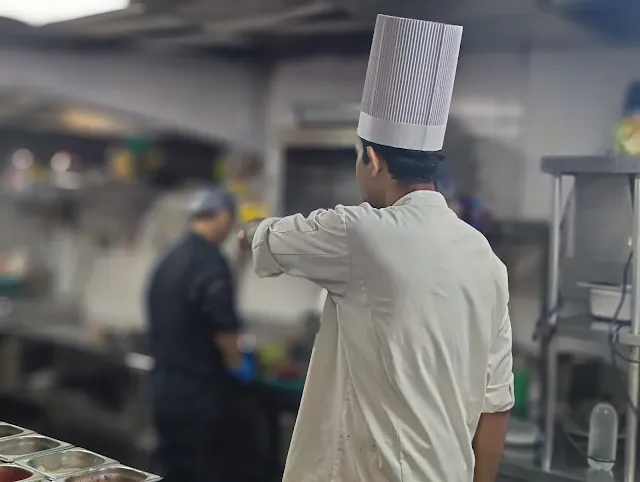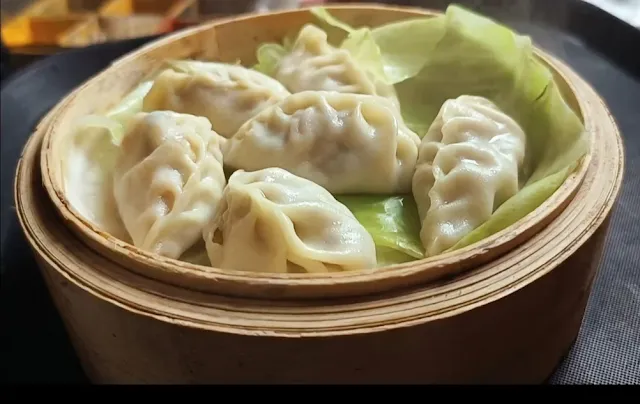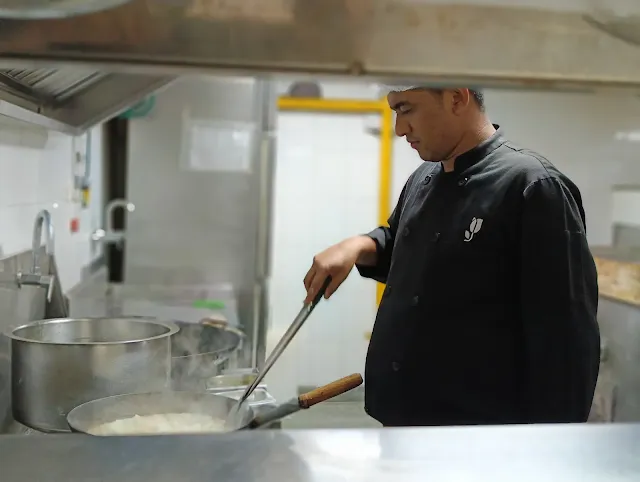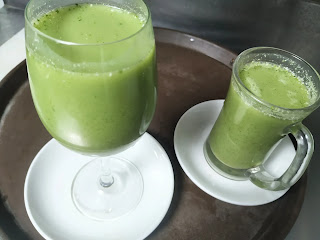What is a Sous Chef
Details about what is a Sous Chef
A sous chef is a culinary professional who holds a senior position in a professional kitchen, typically working under the executive chef or head chef. The term "sous" comes from French and means "under," reflecting the sous chef's role as second in command in the kitchen hierarchy.
Kitchen Hierarchy (hierarchy of Chefs in a restaurant)
The kitchen hierarchy, also known as the kitchen brigade system, is a structured organization commonly used in professional kitchens to ensure smooth operations and effective management of culinary tasks. This system was popularized by the French chef Georges Auguste Escoffier and has been widely adopted in restaurants and hotels around the world. While the exact structure and titles may vary depending on the size and type of kitchen, the following is a typical representation of the kitchen hierarchy from top to bottom:
- Executive Chef: The head chef or executive chef is the top authority in the kitchen. They are responsible for the overall management, menu planning, and coordination of the kitchen operations. The executive chef also oversees the preparation of dishes to maintain quality and consistency.
- Sous Chef: The sous chef, also known as the second-in-command, assists the executive chef in various tasks. They often handle kitchen staff supervision, training, and scheduling. The sous chef also ensures that the kitchen operations run smoothly in the absence of the executive chef.
- Chef de Cuisine (Head Chef): In larger establishments, there might be a chef de cuisine who directly manages the day-to-day operations of a specific kitchen area (e.g., hot kitchen, cold kitchen, pastry). They report to the executive chef or sous chef and are responsible for their designated section.
- Chef de Partie (Station Chef): The chef de partie is in charge of a specific section or station within the kitchen, such as the grill, sauté, pastry, or vegetable section. They oversee the preparation of dishes within their station, maintain quality, and manage any junior staff working with them.
- Commis Chef: Commis chefs are junior chefs who work under the supervision of the chef de partie. They assist in food preparation, cooking, and other kitchen tasks, gaining experience and skills as they advance in their culinary career.
- Kitchen Apprentices: Apprentices are aspiring chefs or culinary students who work in the kitchen to gain practical experience. They often rotate through various stations to learn different aspects of cooking and kitchen management.
- Kitchen Porter/Dishwasher: The kitchen porter, also known as a dishwasher, plays a crucial role in maintaining kitchen cleanliness. They are responsible for washing dishes, utensils, and keeping the kitchen area tidy.
How to become a Sous Chef
Becoming a sous chef is an exciting journey in the culinary
world. It requires dedication, passion for cooking, and a strong set of
culinary skills. Here are the steps you can follow to become a sous chef:
- Gain Culinary Education and Experience: Consider attending a reputable culinary school or enrolling in a culinary arts program. While formal education is not mandatory, it can provide you with a solid foundation in cooking techniques, food safety, and management skills. Additionally, seek opportunities to work in various kitchen environments, such as restaurants, hotels, or catering companies, to gain hands-on experience.
- Start as a Line Cook or Prep Cook: The typical career path to becoming a sous chef involves starting as a line cook or prep cook. These entry-level positions allow you to learn and practice essential kitchen skills, like knife techniques, cooking methods, and recipe execution. Work diligently to master each station in the kitchen.
- Learn from Experienced Chefs: Pay attention to the head chef and sous chef in the kitchen. Observe their techniques, ask questions, and be open to feedback. Working closely with experienced chefs can help you understand the leadership and organizational skills required for a sous chef position.
- Develop Leadership Skills: A sous chef is not just a skilled cook but also a leader in the kitchen. Practice effective communication, teamwork, and problem-solving skills. As you gain more responsibility, you'll need to manage and motivate kitchen staff, coordinate food preparation, and handle high-pressure situations.
- Specialize and Expand Your Knowledge: Develop expertise in specific culinary areas. This could involve mastering a particular cuisine, learning about baking and pastry, or focusing on specific dietary preferences like vegan or gluten-free cooking. The more specialized skills you possess, the more valuable you become as a sous chef.
- Stay Updated with Food Trends and Techniques: The culinary world is ever-evolving, with new ingredients, techniques, and trends emerging regularly. Stay informed and continue learning through workshops, seminars, cookbooks, and online resources. This knowledge will not only keep you relevant but also demonstrate your passion for the craft.
- Obtain Certifications: While not obligatory, obtaining certifications from organizations like the American Culinary Federation (ACF) can enhance your credibility and marketability as a sous chef. Some relevant certifications include Certified Culinarian (CC), Certified Sous Chef (CSC), and Certified Executive Chef (CEC).
- Display a Strong Work Ethic: To progress in the culinary industry, hard work and dedication are essential. Be prepared to work long hours, handle physically demanding tasks, and be adaptable to changing kitchen environments.
- Seek Promotion Opportunities: Express your interest in becoming a sous chef to the head chef or restaurant management. Demonstrate your leadership abilities and willingness to take on more responsibilities. It's crucial to be patient and wait for the right opportunity, as sous chef positions may not always be available immediately.
- Network and Build Relationships: Networking within the culinary community can open doors to new opportunities. Attend culinary events, workshops, and industry gatherings to connect with professionals and potential mentors.
Remember, becoming a sous
chef takes time and commitment. Be persistent, continue learning and honing
your skills, and always be open to feedback and growth.
Sous Chef Full Form
The full form of "sous
chef" is "sous-chef de cuisine." It is a French term that
translates to "under-chef of the kitchen" in English. A sous chef is
the second-in-command in a professional kitchen and works directly under the
head chef. They are responsible for managing the kitchen staff, overseeing food
preparation, ensuring quality and consistency of dishes, and assisting the head
chef in various tasks related to menu planning and kitchen operations.
Sous chef responsibilities and duties
- Assisting the head chef: The sous chef supports the executive chef in managing the kitchen operations. They collaborate closely with the head chef to plan menus, create dishes, and ensure the smooth functioning of the kitchen.
- Supervising the kitchen staff: The sous chef oversees the kitchen staff, including line cooks, prep cooks, and other team members. They delegate tasks, monitor performance, and ensure that the team works cohesively.
- Food preparation and cooking: Sous chefs are skilled in culinary techniques and play a hands-on role in food preparation and cooking. They may be responsible for preparing complex dishes or overseeing the cooking process to maintain quality and consistency.
- Kitchen organization and cleanliness: Sous chefs help maintain a clean and organized kitchen environment. This includes ensuring proper storage of ingredients, managing inventory, and following food safety and hygiene standards.
- Training and development: They may be involved in training new kitchen staff, teaching cooking techniques, and helping team members improve their skills.
- Menu planning and costing: Sous chefs may contribute to menu development and pricing, considering food costs, seasonal availability, and customer preferences.
- Time management: In a fast-paced kitchen environment, sous chefs must be skilled at managing time efficiently to meet service demands and maintain quality standards.
Sous chefs are crucial in maintaining kitchen efficiency and quality, acting as a bridge between the executive chef's vision and the kitchen staff's execution. Their role requires strong leadership, excellent culinary skills, and the ability to thrive in a high-pressure, fast-paced environment. Many sous chefs aspire to become executive chefs in the future, and the position serves as a stepping stone to further career advancement in the culinary world.
Types of Sous Chef
In a professional kitchen,
a sous chef is the second-in-command, directly assisting the head chef in
managing the kitchen and overseeing food preparation. There are different types
of sous chefs based on the specific responsibilities they handle and the areas
they focus on. Here are some common types of sous chefs:
- Junior Sous chef
- Sous Chef
- Executive Sous chef
These are some of the
common types of sous chefs you may encounter in professional kitchens. The
specific roles and titles can vary depending on the establishment's size,
cuisine, and organization. Each type of sous chef plays a crucial role in the
kitchen's overall success by contributing their specialized skills and
knowledge to the culinary team.
Sous Chef skills
A sous chef is a key member of the kitchen brigade and plays
a crucial role in assisting the executive chef in running a smooth and
efficient kitchen operation. To excel as a sous chef, one should possess a
diverse set of skills, including culinary expertise, leadership abilities, and
strong organizational capabilities. Here are some essential sous chef skills:
- Culinary Knowledge: A sous chef must have a strong foundation in culinary arts, including a deep understanding of various cooking techniques, ingredients, and flavors. They should be skilled in preparing, cooking, and presenting a wide range of dishes.
- Food Safety and Hygiene: Maintaining high standards of food safety and hygiene is paramount in a professional kitchen. Sous chefs should be well-versed in food safety regulations and ensure that the kitchen team follows them meticulously.
- Leadership and Management: As a second-in-command, a sous chef must exhibit excellent leadership and management skills. They should be able to motivate and guide the kitchen staff, delegate tasks effectively, and maintain a positive work environment.
- Time Management: In a fast-paced kitchen environment, time management is crucial. A sous chef should be adept at prioritizing tasks, working efficiently, and meeting deadlines to ensure that dishes are prepared and served on time.
- Communication: Effective communication is essential for seamless coordination between different kitchen stations and the front-of-house staff. A sous chef should be able to communicate clearly and assertively to avoid misunderstandings and errors.
- Menu Planning and Development: Sous chefs often assist in menu planning and may be involved in creating new dishes. They should have a good understanding of food trends, customer preferences, and cost considerations.
- Problem-Solving: Kitchen scenarios can be unpredictable, and a sous chef should be skilled at thinking on their feet and finding creative solutions to challenges that may arise during service.
- Kitchen Equipment Proficiency: Sous chefs should be familiar with various kitchen equipment and tools, ensuring that they and their team use them correctly and maintain them appropriately.
- Team Player: Being a team player is essential in a busy kitchen. A sous chef should collaborate well with other kitchen staff, respect their contributions, and foster a harmonious work atmosphere.
- Adaptability: Kitchens can be dynamic environments, with changing menus, events, and unexpected situations. A sous chef should be adaptable and remain composed under pressure.
- Cost Control: Understanding the importance of cost control is vital for a sous chef. They should be mindful of food waste, portion sizes, and proper storage to optimize resources and minimize expenses.
- Training and Development: As a leader in the kitchen, a sous chef may be involved in training and developing junior chefs and kitchen apprentices.
These skills, combined with
passion, dedication, and a commitment to excellence, contribute to the success
of a sous chef in a professional culinary setting.
Difference between Executive Chef vs Sous Chef
In the culinary
world, the roles of an executive chef and a sous chef are both important and
integral to the smooth functioning of a kitchen. They have distinct
responsibilities and positions within the kitchen hierarchy. Let's explore the
differences between the two:
Executive Chef:
- The executive chef is the head chef, also known as the chef de cuisine, in charge of the entire kitchen operation. They are responsible for overseeing all aspects of food preparation, menu planning, and kitchen management.
- Menu Planning: The executive chef is usually the one responsible for creating and designing the menu. They may develop new dishes, ensure variety and quality, and consider customer preferences and dietary requirements.
- Kitchen Management: They handle the overall organization of the kitchen, including staffing, scheduling, and maintaining a clean and safe working environment.
- Decision Making: The executive chef makes crucial decisions related to ingredient sourcing, equipment purchases, and the general direction of the culinary offerings.
- Culinary Vision: They are often the driving force behind the culinary vision of the restaurant, and they strive to ensure consistency and excellence in food quality.
- Creativity: Executive chefs usually have a strong culinary background and bring creativity to the kitchen, elevating the dining experience for customers.
Sous Chef:
The sous chef is
the second-in-command in the kitchen, reporting directly to the executive chef.
The term "sous" is French for "under," indicating their
position.
- Food Preparation: Sous chefs are heavily involved in food preparation, supervising the cooking process, and ensuring that dishes are made to the executive chef's specifications.
- Kitchen Coordination: They assist in managing the kitchen staff, ensuring that everyone works efficiently and cooperatively. This may include training new cooks and delegating tasks.
- Quality Control: Sous chefs play a key role in maintaining food quality and presentation. They may taste dishes to ensure they meet the restaurant's standards.
- Temporary Leadership: In the executive chef's absence, the sous chef may assume temporary leadership and oversee kitchen operations.
- Inventory and Ordering: Sous chefs are often involved in monitoring inventory levels and may help with ordering ingredients and supplies.
In summary, the
executive chef is the top authority responsible for the overall culinary
direction and management of the kitchen, while the sous chef is the immediate
assistant who oversees day-to-day operations, ensuring that the executive
chef's vision is executed efficiently and consistently. Both roles are vital
for a successful and well-functioning kitchen in a restaurant or culinary
establishment.
A brief history of CHEF
The history of chefs and culinary arts is rich and diverse, spanning centuries and cultures. The term "chef" comes from the French word "chef de cuisine," which translates to "chief of the kitchen." Here's a brief overview of the history of chefs:
Ancient Culinary Practices: The roots of culinary arts can be traced back to ancient civilizations such as the Mesopotamians, Egyptians, Greeks, and Romans. In these early societies, cooking was a fundamental skill, and individuals responsible for food preparation were highly regarded.
The Rise of Professional Cooks: With the emergence of more complex societies and elaborate dining customs, specialized culinary roles began to develop. In ancient Rome, for example, there were "cooks" (coqui) who were valued for their culinary expertise.
Medieval Kitchens: In the Middle Ages, culinary practices evolved further. The feudal system and the establishment of grand households brought about the emergence of professional cooks who worked in the kitchens of nobles and royalty.
The Renaissance and Haute Cuisine: During the Renaissance period, culinary arts saw significant advancements, especially in the royal courts of Europe. The French and Italian courts were particularly influential in shaping culinary techniques and creating elaborate dishes, setting the stage for what we now know as "haute cuisine."
The Birth of Modern Restaurants: In the 18th century, the concept of public eating establishments gained popularity in France. The first modern-style restaurant is believed to be "La Grande Taverne de Londres," opened in Paris in the late 1700s by Antoine Beauvilliers. The restaurant offered a diverse menu and professional chefs to prepare the dishes.
Culinary Schools and Professionalization: In the 19th century, the culinary profession began to be formalized. The first culinary school, Le Cordon Bleu, was founded in Paris in 1895. This marked the beginning of culinary education and the standardization of culinary techniques.
Celebrity Chefs and Modern Cuisine: The 20th century saw the rise of celebrity chefs, such as Auguste Escoffier and Julia Child, who brought culinary arts into popular culture through television and books. The globalization of cuisine and the fusion of culinary traditions from different regions also became prominent during this period.
Contemporary Culinary Scene: In recent decades, the culinary world has seen rapid growth, with the advent of molecular gastronomy, farm-to-table movements, and increased interest in diverse cuisines from around the world. The role of chefs has expanded beyond the kitchen, with many becoming advocates for sustainable and ethical food practices.
Today, chefs continue to play a vital role in shaping food culture, experimenting with new ingredients and techniques, and delighting diners with their creations. The profession of a chef is highly respected and continues to evolve with changing food trends and consumer preferences.
It's essential to note that while this hierarchy provides a traditional framework, some modern kitchens may adopt a more flexible and collaborative approach, encouraging teamwork and communication among all members of the kitchen staff. The kitchen brigade system, nevertheless, remains a fundamental model for organizing large-scale culinary operations.
Frequently Asked Questions
1. Is Chef higher than Sous Chef ?
In a traditional kitchen hierarchy, the Chef is higher than
the Sous Chef. Here's how the typical kitchen hierarchy is structured:
Executive Chef : This is the highest-ranking chef in the kitchen. They are responsible for
overseeing the entire kitchen operation, including menu creation, managing the
kitchen staff, and ensuring the quality and consistency of the dishes.
Sous Chef : The Sous Chef is the second-in-command and directly assists the Executive Chef. They are responsible for supervising the kitchen staff, coordinating cooking processes, and often step in to menu creation, managing the kitchen staff, and ensuring the quality and consistency of the dishes.
Chef de Partie (Station Chef) : Each Chef de
Partie is in charge of a specific section or station in the kitchen, such as
the sauce station, grill station, pastry section, etc. They report to the Sous
Chef.
Commis Chef : These are junior chefs who work under the supervision of the Chef de Partie.
They assist with basic food preparation and cooking tasks.
The hierarchy can vary depending on the size and structure of the kitchen, but in most cases, the Chef outranks the Sous Chef. The Chef de Partie and Commis Chef positions also have varying levels of authority and responsibility within their respective sections
2. Who is commis Chef?
A Commis Chef is an
entry-level position in a professional kitchen, and it is one of the first
steps in the culinary career ladder. The word "commis" is derived
from the French term for "assistant." Commis Chefs work under the
supervision of more experienced chefs and are responsible for assisting in
various food preparation tasks.
3. What is the highest rank of Chef?
The highest rank of a chef in the culinary world is often
referred to as an "Executive Chef" or "Chef de Cuisine."
This position is the pinnacle of the kitchen hierarchy and comes with
significant responsibilities and authority.
Popular Chefs dishes are
















